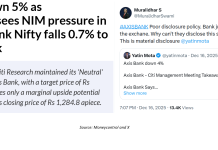After the Reserve Bank of India (RBI) made clear to the board of Axis Bank that it should reconsider its decision to grant the present Chief Executive Officer (CEO) a fourth term, one would have expected the board to have seen the light. But no, shockingly, the board has written to the RBI asking for her to be given a reduced fourth term of seven months, till December 2018. When the RBI does not consider Shikha Sharma to be a fit and proper CEO to continue for 3 more years, why should it agree for her to continue for an additional 7 months? It is actions like this that make investors lose confidence in the Axis board, which appears more interested in salvaging a CEO’s poor reputation than in improving performance for shareholders.
In a humiliating rebuke to the board of Axis Bank, the RBI had reportedly rejected the candidature of Shikha Sharma for a fourth term (to end in May 2021). The RBI rebuke should not have come as a surprise, as, under her leadership, Axis Bank experienced a collapse in performance, deterioration in asset quality, poor operational risk management and 2 consecutive years of fudging of accounts. That a board of directors could even recommend a further term of 3 years for such a CEO should enlighten investors on the competence of the Axis Bank board.
Now, in order to soften the RBI’s sharp rebuke of its CEO and to salvage her reputation, Axis Bank stated,
Shikha Sharma,
Managing Director & CEO of the Bank has requested the Board to reconsider
the period of her re-appointment as the Managing Director & CEO of the Bank
be revised from 1st June 2018 up to 31st December 2018,
The wording of the bank’s filing to the stock exchanges indicates that it is Shikha Sharma who voluntarily wants to cut short her fourth term. Her current request is a far cry from the exuberance she exhibited during an interview with CNBC TV18 when the board recommended her for a fourth term in end July 2017. Responding to a question on the opportunity given to her by the board, she replied,
“I am excited. I am grateful to the board for having given me this extended opportunity. I think we are living right now in one of the most exciting times for India, for the Indian financial system with the amount of stuff that is changing. So you have to exercise every bit of your IQ, EQ. So it is absolutely fantastic and I feel very honoured to have this opportunity.”
Despite the “exciting times for India” and the honour bestowed on her by an ever grateful board what has made her change her mind in less than a year?
The board and Shikha Sharma feign total ignorance of the Economic Times headline article which stated that the RBI had rejected her candidature for a fourth term. The central issue remains: if the RBI has lost confidence in Shikha Sharma and no longer considers her fit and proper to be given a fourth term as CEO, why should it consider her competent to be given a 7 month extension as CEO?
A possible explanation in the media is of succession, since her third term ends on May 30, 2018, it is too short a period to find her successor; there were reports that V. Srinivasan, her second-in-command had earlier submitted his resignation. However, what the media and possibly the Axis Bank board conveniently forget is that Shikha Sharma herself was identified as Axis Bank CEO by the nominations committee of the board in a short span of 2 months, and completely against the wishes of the then chairman and managing director, P. J Nayak, who resigned once the board finalized her candidature as his successor. Hence if the board in 2009 could take such a decision at short notice, the board more than nearly a decade later can also repeat such a performance.
The Axis Bank’s board’s decision to persist with Shikha Sharma despite her poor track record, and even when the banking regulator disapproves of her continuing, speaks volumes for the independence of the board and of the sorry state of corporate governance in the private sector. Private sector boards in the capital market are supposed to be focused on rewarding merit and performance and penalizing under par performance. But the Axis Bank board during Shikha Sharma’s tenure as CEO has rewarded failure and wants to persist with such a CEO for as long as possible. What is even more surprising is that Axis Bank has a board director from Bain Capital, a private equity firm which is known to focus on superior returns. Axis also has considerable foreign and institutional investors, who are similarly focused on performance. Their silence on this entire episode of rewarding non-performance is shocking and a telling reminder of how supposedly free and efficient markets operate in the real world.
DISCLOSURE & CERTIFICATION
I, Hemindra Hazari, am a registered Research Analyst with the Securities and Exchange Board of India (Registration No. INH000000594). I have no position in any of the securities referenced in this note. Views expressed in this note accurately reflect my personal opinion about the referenced securities and issuers and/or other subject matter as appropriate. This note does not contain and is not based on any non-public, material information. To the best of my knowledge, the views expressed in this note comply with Indian law as well as applicable law in the country from which it is posted. I have not been commissioned to write this note or hold any specific opinion on the securities referenced therein. This note is for informational purposes only and is not intended to provide financial, investment or other professional advice. It should not be construed as an offer to sell, a solicitation of an offer to buy, or a recommendation for any security.














